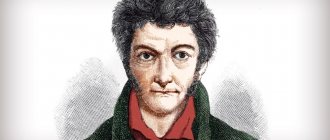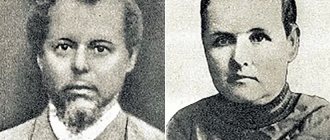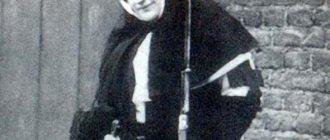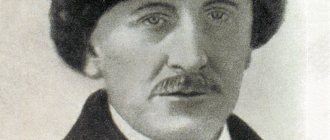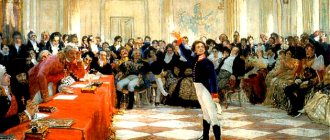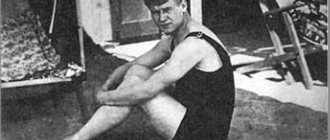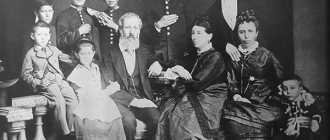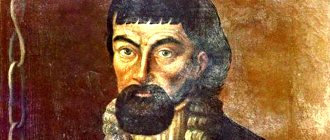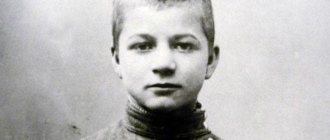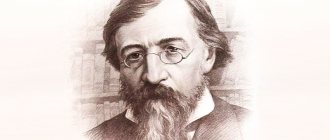Brief biography of V.P. Kataev for children
Option 1
Valentin Petrovich Kataev (1897 - 1986) - Russian Soviet writer, playwright, poet.
Born on January 16 (28 New Year's Day) 1897 in Odessa in the family of a teacher. He studied at the Odessa gymnasium. Odessa largely became Kataev's literary language, and Odessa itself became not just a background for many of Valentin Kataev's works, but their full-fledged hero.
At the age of nine he began to write poetry, some of them were published in Odessa newspapers, and in 1914 Kataev’s poems were first published in St. Petersburg in the magazine “The Whole World”.
Having started as a poet, Kataev remained a subtle connoisseur of poetry all his life. Some of his prose works are named after lines from poems by Russian poets: “The lonely sail turns white” (Lermontov), “Time, forward!” (Mayakovsky), “Werther has already been written” (Pasternak). At the end of his life, Kataev collected all his surviving poems and copied them by hand into seven notebooks. Kataev never published a single collection of poetry.
With the outbreak of the First World War, he volunteered to serve in the active army, in an artillery brigade, where he remained until the summer of 1917.
He met the October Revolution in the Odessa hospital, where he was treated after being wounded on the Romanian front. After demobilization, he made his first attempts to write prose. Kataev considered Ivan Bunin to be his only and main teacher among contemporary writers. In 1919 he was drafted into the Red Army, served as a battery commander, then was recalled from the army and appointed head of the satire windows in Odessa ROSTA: he wrote texts for propaganda posters, ditties, slogans, leaflets. In 1921 he was sent to establish similar work in Kharkov.
In 1922 he moved to Moscow, published his feuilletons in the newspapers “Gudok”, “Trud”, “Rabochaya Gazeta”, without leaving work on fiction. In 1925 he published the story “The Embezzlers,” which was noticed by both critics and readers. This story was dramatized, and the play was successfully staged since 1928 on the stage of the Moscow Art Theater. Inspired by the recognition, Kataev wrote the comedy “Squaring the Circle,” which also had a resounding success. Since then he has constantly written for the theater.
In 1932, having traveled to the construction of Magnitogorsk, Kataev wrote the chronicle novel “Time, Forward!”, which became an important milestone in his work.
In 1936 he published the novel “The Lonely Sail Whitens”; works a lot for Pravda: writes feuilletons, essays, notes, articles. In 1937 the story “I am the son of the working people” was published.
During World War II he worked in the Radio Committee and in the Sovinformburo abroad. He was a war correspondent for Pravda and Krasnaya Zvezda, where his essays from the front were published. During this period, the stories “The Third Tank”, “Flag”, the stories “Wife”, “Son of the Regiment”, the plays “Father’s House”, “The Blue Handkerchief” were written.
In 1949 the novel “For the Power of the Soviets” was published. In 1955, the magazine “Yunost” was created, with V. Kataev becoming its editor-in-chief. Here in 1956 the novel “A Farm in the Steppe” was published.
In the 1960s, “The Grass of Oblivion”, “Holy Well”, and “Cube” were written. In 1978 - “My Diamond Crown”, in 1980 - “Werther has already been written.”
V. Kataev died in 1986 in Moscow.
Option 2
Born in 1897 in the city of Odessa. His family was very educated and had a large library. All this played a role in Kataev’s life. As he himself stated, he began writing at the age of 9, and was absolutely sure that he would become a writer. And the language of Odessa itself became a literary language, and the city the main character of his work. In 1910, a local magazine published his first poem.
During his participation in the First World War, Kataev was not only wounded, but was also awarded 2 awards with the inscription “For bravery.” In the post-war period, Kataev got acquainted with Benin. And it was he who became his teacher and mentor in literary activity. This was followed by the Civil War, in which he took a direct voluntary part. Unlike the other conspirators, Valentin Petrovich got off easy - he suffered from typhus, and soon had to serve only six months in prison for his activities.
In 1921, having moved to Kharkov, he got a job writing a local newspaper. Then he worked as a satirist, collaborating with many Moscow newspapers. In 1936, the story “The Lonely Sail Whitens” was published, and it was this story that made him famous. During World War II he worked as a war correspondent. Wrote many articles, essays, poems. One of his famous poems at that time is “Son of the Regiment”.
In 1955 he founded the magazine “Youth”. In it he published young and unknown prose writers and poets.
In 1978, a book of memoirs, “My Diamond Crown,” was published.
Unfortunately, the writer and poet died in 1986. Many of Kataev’s books have been translated into various foreign languages. His work was popular in the theater, cinema and television. Valentin Petrovich was repeatedly awarded with awards and prizes. In Odessa there are several sculptures dedicated to the characters of Kataev’s stories.
Option 3
Kataev Valentin Petrovich is a Soviet-Russian writer, playwright, poet, memoirist, and since 1974 Hero of Socialist Labor. He is best known for the stories “The Lonely Sail Whitens” and “Son of the Regiment.” The writer was born on January 16 (28), 1897 in Odessa, in the family of a school teacher. The boy began writing poetry quite early, at the age of nine. Some of his works began to be published in Odessa newspapers, and in 1914 even in the St. Petersburg magazine “The Whole World”. Kataev was educated at the Odessa gymnasium, but never completed his studies due to the outbreak of military events in the First World War and the Civil War. He volunteered to join the active army, where he rose to the rank of ensign. In 1917, due to a serious injury, he was returned to the Odessa hospital.
Kataev's literary language was called Odessa. This city was not only the background of many of his works, but also a full-fledged hero. Despite the fact that he will live 64 years of his life in Moscow and the Moscow region, at heart he will remain an Odessa resident. The titles of Kataev's works or the names of the characters were often symbolic in nature.
So, for example, he christened the main character of the autobiographical story “The Lonely Sail Whitens” - Petya Bacheya - with the name of his father and the surname of his mother. He used lines from poems by famous authors as the titles of his prose works. For example, “The lonely sail is white” (Lermontov), “Werther has already been written” (Pasternak). Despite the fact that the writer had many of his own poems, he did not publish a single collection.
The first attempts to write prose were made after his demobilization. He considered I. A. Bunin his idol among his contemporaries. In 1919, Kataev was drafted into the Red Army, but he was soon recalled and appointed head of the ROSTA satirical window. There he wrote texts for slogans, leaflets, ditties, and anti-posters. He performed similar work in Kharkov. Since 1922 he worked in Moscow. Kataev's feuilletons were published in the newspapers Trud and Gudok. His story “The Embezzlers” (1925) was noticed not only by readers, but also by critics. A few years later, this story was successfully dramatized on the stage of the Moscow Art Theater. Soon he wrote another successful work - the comedy “Squaring the Circle” (1928). After that he wrote mainly for the theater.
An important milestone in the writer’s work was the novel “Time, Forward!” (1932). He wrote it after a trip to the construction of Magnitogorsk. During the Patriotic War, Kataev worked as a war correspondent for the newspapers Pravda and Krasnaya Zvezda. It was during this period that the stories “Flag”, “The Third Tank”, and the story “Son of the Regiment” appeared. Since 1955, V.P. Kataev was the editor-in-chief of the newly created magazine “Youth”. The writer died on April 12, 1986 in Moscow. His last book was a collection of memoirs “Dry Estuary” (1986).
Full biography of Kataev V.P.
Option 1
“Son of the Regiment”, “The Lonely Sail Whitens” - in the 70s and 80s, Soviet schoolchildren read these fascinating works, imbued with the spirit of adventure and childhood heroism. However, their author Valentin Petrovich Kataev entered the history of Russian literature not only as a children's writer. He has written numerous novels, short stories, novels - Kataev’s literary heritage includes more than 130 works.
Childhood and youth
The biography of Vali Kataev begins with Odessa at the end of the 19th and beginning of the 20th centuries. In this bustling southern city at the turn of two centuries, on January 28, 1897, the future writer was born. Father Pyotr Vasilyevich Kataev, a teacher at a religious school, and mother, the general’s daughter Evgenia Ivanovna Bachey, instilled in their sons a love of books and reading from early childhood.
Carrying this passion throughout their lives, both brothers devoted themselves to literature: Kataev’s younger brother, Zhenya, became known under the pseudonym Evgeniy Petrov as the author of the famous novels “The Twelve Chairs” and “The Golden Calf” in tandem with Ilya Ilf (Fainzilberg).
The boys were left without their mother early: she died of pneumonia shortly after Zhenya’s birth. The father, having become a widow, never remarried; Evgenia Ivanovna’s sister began helping with raising the children. Aunt was very kind, but she could not replace little Valya’s mother. The trauma of the loss remained forever in the child’s soul.
The boy looked for an outlet in creativity. From the age of 9, already a high school student, he began to write poetry, which he read to everyone at home, seeking approval. As he grew older, the young man began to carry what he had written in the editorial office in search of professional evaluation. And his first success came to him in 1910, when the poem “Autumn” was first published in the publication “Odessa Bulletin”, and then other works, including stories and feuilletons.
Kataev did not have to enjoy creative success for long. The First World War (1914–1918) began, and in 1915, without graduating from high school, the young man volunteered for the front.
War
Kataev began his service as an ordinary artilleryman. He was wounded twice and was poisoned by poisonous gases, which is why his voice remained slightly hoarse until the end. The writer was demobilized with the rank of ensign in the fall of 1917 after being seriously wounded in the thigh. Kataev returned from the war with awards: two Crosses of St. George and the Order of St. Anne.
Before the salvos of the First World War had died down, the Civil War broke out in the country. This period of Valentin Kataev’s biography is described contradictoryly. Some sources say that since 1919 he fought in the ranks of the Red Army and commanded an artillery battery. But there is an alternative version, according to which Kataev joined the “Reds” later, and at the beginning he was a volunteer in the White Army of General Denikin , for which he was subsequently arrested by the security officers.
One way or another, Kataev experienced the hardships of military life in full and described them in the story “Notes on the Civil War” (1920) and the story “Father” (1928).
Literature
Since 1922, a new stage has begun in Kataev’s life and work: the writer moves from Odessa to Moscow, works for the newspaper Gudok. His social circle included many talents of that time: Yuri Olesha , Isaac Babel , Ilya Ilf, Eduard Bagritsky. All of them, following Kataev, left Odessa to conquer the capital, and the successful pioneer helped them settle down.
Luck really smiled on the young writer. His talent is finally recognized in the capital. The publication of the story “The Embezzlers” (1926), in which the author in a satirical manner criticizes the social scourge of the time - the misappropriation of government money, was marked by great success. Stanislavsky himself suggested that Kataev stage a play based on the story. And soon she walked on the stage of the Moscow Art Theater. And the second play, “Squaring the Circle,” was staged on New York Broadway.
Following his older brother, Kataev Jr. came to conquer Moscow, whom Valentin Petrovich began to involve in the writing community.
“Every intelligent, literate person can write something,” he said.
It is noteworthy that, admonishing his brother, Kataev initiates the writing of an adventurous novel about diamonds hidden during the revolution. He shares the idea with Evgeny and his friend Ilya Ilf, inviting them to write a draft of the novel, which he himself would then improve and promote for publication.
What came of this is already common knowledge. Ilf and Petrov (Evgeniy took a pseudonym after his father’s name) brilliantly coped with the task without mentoring. The written novel was widely quoted, and in gratitude for the idea it was published with a dedication to Valentin Kataev.
Valentin Petrovich was destined to go through three wars. During World War II, he again put on his military uniform and went to the front line. He worked as a front-line correspondent, wrote essays, articles, and took photographs. A famous work of that time was the story “Son of the Regiment” (1945): the image of the main character Vanya Solntsev personifies the tragic fate of many children during the war.
Kataev turned to the theme of children back in the pre-war years, when he wrote the story “The Lonely Sail Whitens,” in which the author immerses himself in the atmosphere of his native Odessa. In the characters Pete and Pavlik, who are involved in a cycle of adventure against the backdrop of a city destroyed by the 1905 revolution, one can discern the features of Kataev himself and his brother Zhenya.
The story “The Lonely Sail Whitens” (1936) opens the tetralogy “Waves of the Black Sea”, which later included the novels “Catacombs” (1951), “A Farm in the Steppe” (1956) and “Winter Wind” (1960–1961).
If “Sail” can only be partially called autobiographical, then critics openly called the novel “My Diamond Crown” a memoir. The writer himself did not agree with this interpretation and even abandoned the genre definition of a novel.
“This is a free flight of my imagination, based on true incidents,” he said.
Kataev worked on the book in 1975–77, and the events described take the reader into the world of literary bohemia of the 20s.
The originality of the work lies in the fact that, despite the real basis of the plot, the heroes, and these are famous writers and poets - contemporaries of the author, are veiled by pseudonyms-masks. And the novelty is that Kataev wrote for the first time in a style, genre and direction that was unusual for himself.
Personal life
The first mention of the writer’s personal life is associated with the name of Irina Aleksinskaya. Tender feelings for a girl living next door became the young man’s first love. Nothing is known for certain about Kataev’s first marriage, but his second marriage turned out to be happy. They married Esther Brenner in 1931. The bride was only 18 years old, Kataev was 34.
Valentin Petrovich affectionately called his wife Est. In 1936, the couple had a daughter, Evgenia, and in 1938, a son, Pavlik. Valentin Petrovich adored his daughter. Little Zhenya became the prototype of the heroines of the fairy tales “The Flower of Seven Flowers” and “The Pipe and the Jug.” Daughter Evgenia gave her parents their first and only granddaughter, Valentina.
Death
Already very old, Kataev underwent a complex operation to remove a cancerous tumor. But the cause of death was not cancer. The writer died 12 years later from a stroke, at the age of 90, on April 12, 1986.
Esther Davydovna survived her husband by 23 years. They lived in a happy marriage for 55 years. The couple are buried in the same grave at the Novodevichy cemetery in Moscow.
Option 2
Soviet writer, playwright and poet Valentin Petrovich Kataev was born on January 28 (January 16, old style) 1897 in Odessa. His father was a teacher at the diocesan school, his mother was the daughter of a general and came from a noble family.
Valentin Kataev’s first work, the poem “Autumn,” was published in 1910 in the newspaper Odessa Vestnik.
In 1915, during the First World War (1914–1918), without graduating from high school, Kataev volunteered for the front. He presented correspondence and essays about the trench life of soldiers - “Letters from there”, “Our everyday life”, “Ilya Muromtsy”.
At the front he was wounded twice and suffered gas poisoning. For his military services, Kataev was awarded two Crosses of St. George and the Order of St. Anne, IV degree, promoted to second lieutenant and awarded the title of personal, non-heritable nobility.
At the beginning of the Civil War, Kataev fought on the armored train “Novorossiya” as part of Denikin’s army. After the establishment of Soviet power in Odessa, he was imprisoned for several months by the Odessa Cheka for counter-revolutionary activities.
In 1919 he was mobilized into the Red Army and commanded an artillery battery on the Don Front. Impressions of that period of life were reflected in the autobiographical story “Notes on the Civil War” (1920).
In 1922, Kataev moved to Moscow. Since 1923, he was a permanent contributor to the newspapers Gudok, Pravda, Trud, and Rabochaya Gazeta. Young Kataev’s social circle in the 1920s included writers Mikhail Bulgakov, Ilya Ilf, Yuri Olesha, poets Vladimir Mayakovsky, Sergei Yesenin, Velimir Khlebnikov, Boris Pasternak.
In the 1920s, Kataev published the novels “The Lord of Iron” (1924), “Ehrendorf Island” (1924).
During this period, he published collections of satirical stories “The Bearded Baby” (1924), “The Funniest Thing” (1927). The stories “Ignatius Pudelyakin” (1927), “Child”, “Things” (both 1929) are also marked by sharp satire on vulgarity and philistinism.
His comedies “The Embezzlers” (1928, based on the 1926 story of the same name, a satire on NEP reality) and “Squaring the Circle” (1928) were staged on Moscow stages.
In 1932, after two years of work, his avant-garde novel “Time, Forward!” was published, written under the impression of a trip to Magnitogorsk. In 1937, the heroic-revolutionary story “I, Son of the Working People...” was published.
The story “The Lonely Sail Is White,” written in 1936, brought the writer worldwide fame. In 1937, a film of the same name was made based on the work. The story became the first part of the tetralogy “Waves of the Black Sea”. Her second part, “A Farm in the Steppe,” was written in 1956, and the third part, “Winter Wind,” in 1960–1961. The fourth part was written in 1948 and was originally called “For the Power of the Soviets”; a film was made from it with the same name in 1956; in 1951 it was published in a second version under the title “Catacombs”.
During the Great Patriotic War (1941–1945), Kataev served as a war correspondent. The story “Son of the Regiment” (1945), which was awarded the Stalin Prize in 1946, brought enormous popularity to the writer. A play of the same name was written based on the work and a film was made in 1946.
In 1955–1961, Valentin Kataev served as editor-in-chief of the Yunost magazine.
In the 1960s, Kataev wrote a journalistic story about Vladimir Lenin “The Little Iron Door in the Wall” (1964), lyrical and philosophical memoir stories “Holy Well” (1967), “The Grass of Oblivion” (1967), “Cube” (1969) .
His memoir and fiction book “My Diamond Crown” (1978) is dedicated to the literary life of Moscow in the 1920s.
In 1980, a story about the repressions of the Odessa Cheka “Werther has already been written” was published.
In 1982, his “Youth Novel” was published - a collection of letters - the love story of a young soldier for a general’s daughter against the backdrop of the First World War.
Based on the writer’s works during his lifetime, the films “The Motherland Calls” (1936), “The Lonely Sail Whitens” (1937), “Son of the Regiment” (1946), “Pages of Life” (1948), “Crazy Day” (1956), “For the power of the Soviets” (1956), “Time, forward!” (1965), “A Farm in the Steppe” (1970), etc.
Kataev was a corresponding member of the Academy in Mainz (Germany), a member of the Goncourt Academy.
The writer's work has been awarded various awards. In 1946, Kataev was awarded the Stalin Prize of the second degree. In 1974 he was awarded the title of Hero of Socialist Labor. The writer was awarded three Orders of Lenin, the Order of the October Revolution, two Orders of the Red Banner of Labor, the Order of Friendship of Peoples, and medals.
On April 12, 1986, Valentin Kataev died in Moscow. He was buried at the Novodevichy cemetery.
Since 1934, Kataev was married to Esther Brenner. In 1936, their daughter Evgenia was born, and in 1938 their son Pavel. Pavel Kataev became a writer, known as the author of the fairy-tale books “The Girl and the Squirrel” and “Flying on a Dragonfly”, and the novel “Alone in the Ocean”.
The writer’s younger brother, Evgeny Petrov (1902–1942), real name Evgeny Petrovich Kataev, co-authored with Ilya Ilf the novels “The Twelve Chairs” (1928) and “The Golden Calf” (1931).
Option 3
Valentin Petrovich Kataev (1897 - 1986) - Soviet writer, known for his works in journalism, prose, poetry, and drama. He has the title of Hero of Socialist Labor.
Childhood
The future writer was born on January 28 in Odessa. His family was intelligent and very educated. My father came from a priest’s family, received an excellent education and later taught at several local schools. Her mother came from an ancient Cossack family and was the daughter of a high-ranking general.
Six years later, Valentin had a younger brother. But soon a misfortune happened: the mother fell ill with pneumonia and died. Fortunately, her sister took care of the children, who loved them very much and in many ways managed to replace the lost loved one for the boys.
The cult of books has always reigned in the Kataevs' house. One of the family's favorite ways to spend time was reading aloud every night. The presence of a huge library in the house opened the way for growing boys to many worlds contained on the pages of dozens and hundreds of volumes.
Valentin wrote his first poems at the age of ten. According to his own recollections, he was constantly in creative excitement, trying to throw out on paper the thoughts and feelings that were crowded in his head. With the conviction in his own uniqueness characteristic of childhood, little Kataev did not doubt for a second that his creations were worthy of being read by the general public. Therefore, with almost every poem, he went on a campaign to all the editorial offices available in the city. The child’s creations were accepted, but not printed.
One day, one of the editors, seeing that the boy had a talent that needed polishing, advised him to send the poems not to the newspaper, but to some writer who could give him advice and guide him on the right path. This is how Kataev met Alexander Fedorov, who took him under his wing. It was he who first discovered Bunin’s work to the boy, from whom he was truly delighted.
Very soon Valentin met his idol in person. Bunin appreciated his admirer's talent and agreed to teach him. It was he who instilled in him the wonderful habit of being creative every day, even if he had absolutely no desire to do it.
First World War
The First World War burst into the life of young Kataev like a real destructive hurricane. At the time he was sent to the front, he was still studying at the gymnasium and was passionately in love with his neighbor Irina Aleksina. It was with her that he corresponded during the years of battle and received the moral support that his young soul, which found itself in real hell, so needed.
All the years spent in the trenches and transitions, Kataev did not stop writing. Creativity was the important thread that connected him with the normal world, in which there were no mass deaths and exploding shells. The writer was wounded twice and received many awards, one of which was the title of nobility.
But the most important result of the war for Kataev were his works, written both during the difficult years and those that followed, on which the imprint of the bloody events was clearly felt.
After the revolution
After the revolution, Odessa resembled a disturbed hive, which not only could not establish internal order, but also constantly changed hands. People simply did not understand what world they were in, who was their friend today, who was their enemy, and who would replace them tomorrow.
Kataev was a member of the literary association “Green Lamp”, but in those years he rarely managed to enjoy his own creativity and communication with talented colleagues. Instead, he took part in ongoing hostilities.
In 1920, Kataev was sent to the hospital with typhus, and then returned home to Odessa. At that time, Soviet power already dominated the city. From her point of view, the young man looked very unreliable, so he was taken into custody. Fortunately, he was not shot outright, as happened all the time. And then chance helped. One of the security officers recognized him as a talented poet. So Kataev found himself free and now part of the Red Army. After some time, he was recalled back to the city and sent to work at one of the local newspapers.
Soon Valentin Kataev found himself in Kharkov, and then went to Moscow, because it was there that he saw many opportunities for his creative development.
Moscow
In the capital, Valentin Kataev devoted himself entirely to literature. He wrote several plays that were staged and were successful with audiences.
In 1931, the already quite famous writer married a girl who was 16 years younger than him. Her name was Esther Brenner. The eighteen-year-old beauty captivated him not only with her appearance, but also with her education, her ability to feel subtly and, of course, with the admiration that was read in her eyes when looking at her husband.
The Great Patriotic War
Kataev again spent the years of World War II on the battlefields. This time he was a war correspondent.
It was under the influence of these events and acquaintances that the story “Son of the Regiment” was written, for which the writer received the “Stalin Prize”.
Peaceful life
In the post-war years, Valentin Kataev continued to collaborate with many printed publications. In particular, the famous magazine “Youth” became his real brainchild, of which he was editor-in-chief for 20 years.
In 1978, Kataev wrote the book “My Diamond Crown.” These were peculiar memoirs, most of the participants of which appeared under fictitious nicknames. This allowed the writer to bring out many images without being subjected to repression, which Kataev managed to happily avoid all his life, despite the fact that it seemed that he did everything to perish in the Siberian camps. A writer who is not afraid of anything, who cuts the truth and spits out snide jokes left and right, for some reason did not irritate the Soviet government, which usually does not tolerate such behavior.
It can be assumed that this became possible thanks to the enormous merits of the writer, who created many stories, novels, poems, plays and scripts for films.
Valentin Kataev died on April 12, 1986. The famous writer found his final refuge at the Novodevichy cemetery.
LiveInternetLiveInternet
Quote from stewardess0202
Read in full In your quotation book or community!
TO BE REMEMBERED. Kataev Valentin Petrovich
Knight of two Crosses of St. George Knight of the Order of St. Anne, 4th degree Laureate of the State Prize (1946, for the story “Son of the Regiment”) Hero of Socialist Labor (1974) Knight of three Orders of Lenin (1939, 1974)
“It’s good to be a pure drop and conceal worlds within yourself!” Valentin Kataev
“He himself is to blame for so much, he stood for us like a boulder, angry, and angular, and gentle - the great Valun.”
Evgeniy Yevtushenko
Valentin Kataev was born on January 28, 1897 in Odessa.
His father Pyotr Vasilyevich Kataev was a very educated man. He was born into the family of a priest from Vyatka, studied at a theological seminary, then graduated with a silver medal from the Faculty of History and Philology of Novorossiysk University and taught for many years at the cadet and diocesan schools of Odessa. Mother Evgenia Ivanovna, nee Bacha, was the daughter of a general who came from an ancient family of Zaporozhye Cossacks. Many years later, Valentin Petrovich Kataev gave this surname to the hero of his autobiographical stories. The couple lived happily, six years later they had another son, Evgeniy, who later became one of the co-authors of the famous novels “The Twelve Chairs” and “The Golden Calf.” Soon after the birth of her youngest son, Evgenia Ivanovna died of pneumonia and her sister helped raise the children, replacing the mother of the orphaned children.
The Kataev brothers grew up surrounded by books. The family had an unusually extensive library - complete works of Pushkin, Lermontov, Gogol, Chekhov, Turgenev, Nekrasov, Leskov, Goncharov, a lot of historical and reference literature - “History of the Russian State”, the Brockhaus and Efron encyclopedia, Petri’s atlas. The love for Russian classical literature was instilled in them from childhood by their parents, who loved reading aloud. “In my books, I often described Russian intelligent families,” recalled Valentin Kataev. “Our family served as a prototype for me - dad, mom, the warmth of family relationships that reigned in our house, the deepest decency, selflessness. Since childhood, I have heard the names of Pushkin, Gogol, Tolstoy, Leskov. There was a twelve-volume treasured Karamzin in the bookcase.”
From the age of nine, Valentin Kataev wrote poetry. He later recalled: “I had been writing poetry for a long time and was, like all young poets, in a state of eternal mental turmoil: I ran around the editorial offices of local newspapers indiscriminately, read my poems to anyone in the gymnasium, during breaks, asked the opinions of my comrades, family, dads, aunts, tormented his younger brother Zhenya, the future Evgeniy Petrov, with his works, sent his poems to his grandmother in Yekaterinoslav, and even became known among his schoolgirl acquaintances as slightly crazy. And all this only because no one could explain to me some - as I thought then - the most important secret, reveal some of the most intimate secrets of poetry, without which one could really go crazy, not understanding what it was all for it is written what all these well-known rhymes, meters, stanzas mean a long time ago, since the time of Lomonosov - already written a thousand times by someone before, read and re-read a thousand times and, in fact, from an internal feeling, have nothing in common personally with me, with my life, with my destiny, with my interests - some pale “silent nature breathes cold, gray waves boil furiously” and so on.”
The editors accepted Kataev's manuscripts, but were in no hurry to publish the unknown high school student. Finally, one of the poems, “Autumn,” was published in the Odessky Vestnik newspaper in December 1910. Inspired by success, the thirteen-year-old poet continued to storm the editorial offices, leading his younger brother with him. Evgeny Petrov later recalled: “He... took me around the editorial offices. “Zhenya, let’s go to the editorial office!” I roared. He took me because he was scared to go alone.” This continued until one of the journalists advised Kataev to let a real writer read his poems. Kataev knew who to turn to - his schoolmate had repeatedly boasted that his father was a writer. And Kataev went to Alexander Mitrofanovich Fedorov, who soon began to introduce him to his friends as a young poet and his talented student. It was from Alexander Fedorov that Valentin first heard the poems of Ivan Alekseevich Bunin. Kataev later recalled: “I saw the miracle of true poetry: a new world opened up before me. That same evening I asked my dad to buy me a book of Bunin’s poems. My father looked at me through his pince-nez with eyes that, in my opinion, brought tears of tenderness: finally, his foolishness came to his senses. He asks to buy him not skates, not a soccer ball, not a blow gun, not a tennis racket, but a book. And not “Sherlock Holmes” by Conan Doyle, not “The Mystery of the Yellow Room” by Gaston Leroux, but a wonderful book by the Russian poet. Perhaps this was the only truly happy day in his life. Fathers will understand this. And the children will understand too. But not now, but over time.”
In those years, Bunin visited Odessa every year. Time passed, and Kataev met him personally. Bunin reacted with sympathy to the young author, and months of apprenticeship and living lessons began in Kataev’s life, which he later spoke about many times in his memoir prose. Bunin instilled in Kataev a taste for daily work, he taught: “You must write poetry every day, just as a violinist or pianist must certainly play his instrument for several hours every day without missing a beat. Otherwise, your talent will inevitably become scarce and dry up, like a well from which no water is drawn for a long time. What should I write about? About anything. If you don’t have any topic or idea at the moment, then simply write about everything you see. A dog is running with its tongue hanging out - describe the dog. One, two four-verses. But it’s certain, it’s certain that it was this dog, and not some other one. Describe the tree. Sea. A bench. Find the only true definition for them. Describe the sound of gravel under the sandals of a girl running to the sea with a towel on her shoulder and swim bladders in her hands. What is that sound? A creaking is not a creaking. The ringing is not ringing. The rustle is not a rustle. Something else - pebble - requiring the only necessary, true word... Writing every day, regularly, without waiting for inspiration, mood and the like, writing is like going to the service... or to the gymnasium.” Bunin saw how Kataev sought to publish each of the poems he wrote in Odessa Bulletin, Southern Thought, Odessa List, Awakening, Lukomorye, and advised him not to rush. He understood how the young poet wanted to see his name published, and warned, explaining that at one time he himself was in a hurry and published a lot of weak things, which he later regretted.
The family of Colonel Aleksinsky lived next to the Kataevs. The eldest daughter, the favorite of the whole family, Irina, painted, wrote poetry, played the piano, and sculpted. She wrote down her favorite poems in a special notebook. In the Aleksinsky house, something between a literary club and a fan salon was formed. And Kataev fell in love with the young talented beauty. He dedicated his poems to her, and later, many years later, she became the prototype of the heroines of his prose. The First World War began. And in 1915, without graduating from high school, Kataev volunteered for the active army. He served in an artillery brigade under the command of Colonel Aleksinsky, Irina’s father. The lovers wrote letters to each other, including in poetry. Valentin Kataev wrote to Irina Aleksinskaya: “I received your letter. Thank you. It warmed me up, and this is very useful: the dugout is damp, cold, the walls are leaking, you can only sleep bent over, and besides, the only glass of the window was broken by the sounds of gunfire, and now we are sitting in the dark, since we had to seal the hole with a board... Your letter says amazingly true things about my current and former life. This is exactly the consciousness I have: something is forever lost. I remembered that last summer, in a past life, I scribbled poems that I suddenly remembered... Then, I confess, I was a little in love with you. Remember my idiotic declaration of love on your balcony in the fall? But why “was I thinking about someone distant?” But it was still a glorious time. But you will never get him back...”
While in the army, constantly risking his life, Kataev remained faithful to Bunin’s behest “to write every day, regularly, without waiting for inspiration or mood.” And he wrote - stories, essays. He sent his poems not only to his beloved, but also to metropolitan magazines, which by that time were already eagerly publishing them. In December 1916, Valentin returned to Odessa to study at the infantry school. For several months, the fire of battle was replaced by the silence and comfort of home. He still spent a lot of time with the Aleksinskys, and Irina’s notebook was replenished with poems from the lover Valentin. In May 1917, Kataev again found himself at the front, in July he was seriously wounded and remained in an Odessa hospital until November. There he wrote “Three Sonnets,” which were published in the “First Almanac of the Literary and Artistic Circle” in early 1918.
During the First World War, Valentin Kataev was seriously wounded twice and poisoned with phosgene, which left him with a hoarseness in his voice for the rest of his life. He was awarded two St. George Crosses and the Order of St. Anne IV degree, better known as “Anna for Bravery,” promoted to second lieutenant and granted the title of personal, non-heritable nobility. His son Pavel Kataev recalled that many years later, talking about his injury and showing the scars that remained for life, “his father did not dramatize the situation at all, that is, he treated the incident with complete calm, as if he believed in his invulnerability.”
Impressions associated with the hardships of war, suffering, blood, pain were later reflected in his books - from the earliest to the latest - “Notes on the Civil War” in 1920, “The Holy Well” in 1965, “The Grass of Oblivion” in 1967 year, “Cemetery in Skulany” in 1975 and other works.
After the revolution, Odessa was flooded with refugees, since the south of the country at that time had not yet been affected by the food crisis. Kataev later recalled: “Meanwhile, life went on as usual, and at times it even began to seem that nothing special had happened: just people, following the example of previous years, came to the south to spend the summer on the Odessa coast - not refugees, not emigrants, but ordinary summer residents with all with their blue enamel saucepans, Graetz kerosene stoves, bathing caps, bicycles, “skorokhod” sandals, croquet... Perhaps there were much more of them, these summer residents, than usual, but this did not cause much concern: just a successful summer, a good the weather and, as it was written in the Odessa Leaflet, “a large influx of summer residents, the holiday season is in full swing,” so that one dacha was occupied by two or even three visiting families.” In those years, the association of poets “Green Lamp” operated in Odessa; young Odessa writers took part in literary meetings, including Eduard Bagritsky, Leonid Nezhdanov, Yuri Olesha, Anatoly Fioletov, Zinaida Shishova. A little later, Alexey Tolstoy and his wife, poetess Natalya Krandievskaya, joined the circle. Valentin Kataev also became an active participant in the Green Lamp.
Still, the situation in the city was very alarming. Odessa changed hands several times during the years 1917-1919, sometimes battles took place right on the streets of the city. In the fall of 1918, Austrian troops entered Odessa. The population was demanded to hand over their weapons. In the hallway of the Kataevs his officer’s saber “for bravery” with an Annensky red lanyard hung openly - Kataev was not afraid. During the search that the Austrians came with, he showed a saber. “An Austrian officer,” recalled Valentin Petrovich, “as young as me, all dark gray, ironed, wearing leggings and a brand new cap, turned it over in his hands with suede gloves, read the inscription from the folds: “For bravery” - and returned it to me with smart army courtesy, saying that I could keep it, since “you can’t take such a weapon with your bare hands.”
Incredible chaos, in which it was completely unthinkable to somehow organize one’s life, political confusion, collapse of hopes - this is what this period was like for Kataev, “a boy from an intelligent family, the son of a teacher, a silver medalist at the Novorossiysk University, the grandson of a major general and Vyatka cathedral archpriest, great-grandson of the hero of the Patriotic War of the twelfth year, who served in the troops of Kutuzov, Bagration, Lanzheron, Ataman Platov.” Kataev painfully searched for his path. In 1918, he joined the armed forces of Hetman Skoropadsky, and after the fall of the hetman, he joined Denikin’s volunteer army. He served in the most dangerous place of the Novorossiya armored train as the commander of the first tower, which participated in battles on two fronts - against the Petliurists in Vinnitsa and against the Reds in Berdichev. At that time, Kataev wrote a poem:
“What is England, Poland and France to me! Bullets, howl and wind, howl. Tired of wandering around stations in my armored tower. What is white, blue, scarlet to me, - If at night in the countless stars Unprecedented flames of fullness Turn blue in the alcoholic snows. Neither a cross nor a flannel shirt can buy you my freedom. I’m tired of shooting up villages and smashing water pumps point-blank.”
At the beginning of 1920, Valentin Kataev fell ill with typhus and was evacuated to an Odessa hospital, from where his family, who had not yet fully recovered, took him home. By that time, Soviet power had already been finally established in Odessa. Valentin Kataev was in prison at the Odessa Cheka for several months, awaiting death for counter-revolutionary activities. The writer’s son Pavel Kataev recalled: “Who was my father at that time? The son of a teacher at a diocesan school, who received the rank of nobleman (not inherited), a former high school student and volunteer in the tsarist army, a participant in the war with Germany, who rose to the rank of ensign and was awarded three military decorations, a young Odessa poet... No specific charges of counter-revolutionary activity were brought against him. , but the biography was clearly suspicious, not “ours”, and at any moment the investigation could come to the conclusion of unconditional guilt and harsh charges. In the meantime, while awaiting a decision on his fate, my father remained in prison, where, as they say, he settled down, got used to it and even continued to write poetry. They stopped calling him in for questioning. According to him, he had the impression that they had forgotten about him and did not pay attention to him. And this situation suited him - he remained alive.”
Kataev was saved by a miraculous accident: during the next interrogation, one of the security officers recognized him, who remembered his speeches at the literary meetings of the Odessa poets’ society. So in September 1920, Valentin Kataev was freed. He later wrote about this terrible episode of his life in the story “Father,” which is largely autobiographical, and, according to the author, his most beloved and “experienced” work. He also described the terrible sound of a working dynamo, drowning out the screams of those being shot: “There was complete darkness over the city. The power station did not work. There was no light in the houses. Only one huge, sleepless house in the middle of the empty and black city probably shone through all its frequent windows at this terrible hour. There, in the basements, the dynamo, the only electric motor working in the city, hummed hard, tight and high.” Having freed himself, the hero of the story came to the idea that “something needs to be done, something needs to be done immediately, to cling to something and be drawn into this alien and joyful life that was in full swing in the city...”. The story could not be published for many years, and Kataev read it in Moscow literary drawing rooms.
After his release, Valentin Kataev took part in the civil war in the Red Army as a battery commander. Impressions of that period of life were reflected in the autobiographical story “Notes on the Civil War.” He was recalled from the army to work in the Odessa branch of the Ukrainian Press Bureau. In “Notes on the Civil War,” Kataev recalled this: “Poets wrote quatrains for posters, which were read by everyone, from a factory owner in trouble to a cook going to enroll in a trade union.” This work not only became the first stage in Kataev’s new biography as a journalist and writer, but also introduced him closer to Yuri Olesha and Eduard Bagritsky. He headed the “Windows of Satire” of the Odessa branch of ROSTA, published feuilletons, poetic signatures, and wrote stories.
In 1921, Valentin Kataev worked in one of the Kharkov newspapers. “I live in Kharkov on the corner of Devichaya and Chernoglazovskaya - this is impossible in any other city in the world,” he wrote from Kharkov. There he met Osip Mandelstam, whose wife Nadezhda Mandelstam recalled: “Oh. M. treated Kataev well: “He has a real gangster chic,” he said. We first met Kataev in Kharkov in 1922. He was a ragamuffin with smart, lively eyes, who had already managed to get into trouble and get out of very serious troubles. From Kharkov he went to Moscow to conquer it. He came to us in Moscow with a bunch of jokes - the folklore of Mylnikov Lane, the early bohemian apartment of Odessa residents. We later read many of these jokes in “The Twelve Chairs” - Valentin gave them to his younger brother... As a boy, he escaped from mortal fear and hunger and therefore wished for strength and peace: money, girls, the trust of his superiors... “They are all like that,” said O. M., “only this one is smart.”
In 1922, Valentin Kataev moved to Moscow and began working for the Gudok newspaper. Fame came to him after writing the topical phantasmagorical story “The Embezzlers,” the material for which was Rabkor materials. The story was published in 1926 in the magazine Krasnaya Nov. Konstantin Stanislavsky suggested making a play out of it and staging it at the Moscow Art Theater. The writer accepted the offer, and already in 1927 the play was ready and staged. Kataev’s second play, “Squaring the Circle,” was a success in the mid-1930s not only in Moscow, but also in New York, on Broadway.
Valentin Kataev signed his newspaper articles and feuilletons with the pseudonyms Old Sabbakin, Ol. Twist, Mitrofan Mustard. And to his friends he was Valun, sometimes even the great Valun, and sometimes simply Kataich. He was the first of a cohort of Odessa writers who left in the first half of the 1920s to conquer the capital. Yuri Olesha, Isaac Babel, Ilya Ilf, Lev Slavin, Semyon Gekht, Eduard Bagritsky followed him. Bagritsky, who did not want to exchange his established life in Odessa for the instability in the capital, Kataev simply left him no choice - he bought him a ticket to Moscow and made an appointment at the station half an hour before the train departed. But the first of this glorious company was still he - Valentin Kataev. And as a pioneer, he helped fellow countrymen settle in a new place; many lived with him for the first time. He wrote later: “Almost all my friends followed me through my room, rushing from the south, as soon as the civil war ended, to conquer Moscow.” Following Kataev, they came to work at the newspaper “Gudok” and a unique atmosphere of wit and irony developed there; according to Konstantin Paustovsky, “the funniest and caustic people in Moscow at that time” worked at “Gudok”. Following his older brother, the younger brother also came to Moscow. It was Valentin Kataev who became Evgeniy’s mentor on his path to writing. While Evgeny intended to work in the Moscow police, Valentin said that “every more or less intelligent, literate person can write something.” And at the insistence of his older brother, Evgeny Kataev wrote his first feuilleton, which was based on real events, and soon became a professional journalist for the Gudok newspaper. He left the right to use his real surname to his older brother, and took a pseudonym for himself, derived from his patronymic - Petrov.
The idea of creating the famous novel “The Twelve Chairs” belonged to Valentin Kataev. This is how he himself talked about it: “Having read somewhere gossip that the author of The Three Musketeers did not write his numerous novels alone, but hired several talented literary assistants who embodied his plans on paper, I decided one day to become something like Dumas-pera and command a bunch of literary mercenaries. Fortunately, at that time my imagination was in full swing, and I absolutely did not know what to do with the plots that came to my mind every minute. Among them appeared a plot about diamonds hidden during the revolution in one of the twelve chairs of the living room set... Then I was toying with my theory of a moving hero, without which not a single fascinating novel can do: it makes it possible to be transported in space and include many incidents , which readers love so much.” Valentin Kataev expressed his thoughts to Ilya Ilf and his brother. The work was supposed to be divided as follows: Ilf and Petrov were supposed to write a draft of the novel based on the idea proposed by Kataev, and then he himself would “walk through it with the hand of a master.” The result would be a “funny picaresque novel” published under the names of all three authors. The proposal sounded quite convincing, because Kataev was already very popular - the play “The Embezzlers” was successfully performed at the Moscow Art Theater, the adventure-utopian novels “Erendorf Island”, “Lord of Iron”, the stories “The Kranz Experience”, “The Golden Pen”, “ Notes on the Civil War", collections of stories "The Bearded Little One", "The Funniest Thing". There was no doubt that if he had co-authored the novel, it would certainly have been published without delay. “They examined each other from head to toe, not without curiosity,” Kataev recalled. “An electric spark, as they say in old novels, slipped between them. They smiled welcomingly at each other and agreed to my proposal.”
But according to Valentin Kataev, he himself had no idea what this would lead to: “Why did I choose them as my blacks - my friend and my brother? This is difficult to answer. Here, probably, my intuition, a dog’s nose for talents that had not yet fully manifested themselves, played a certain role.” When the first part of the novel was ready, Kataev read it. The content came as a complete surprise to him. “Within ten minutes it became clear to me,” he wrote, “that my slaves had fulfilled all the simple plot moves given to them and perfectly depicted the portrait of Vorobyaninov suggested by me, but, in addition, they introduced a completely new, magnificent character they had invented - Ostap Bender, name which has now become a household name." Kataev refused to participate in writing the novel, admitting that “the students beat the teacher, like the Russians beat the Swedes near Poltava.” But Ilya Ilf and Evgeny Petrov have not forgotten to whom exactly they owe the idea of the novel: all editions of “The Twelve Chairs,” starting from the very first, were published and are now being published with a dedication to Valentin Petrovich Kataev.
In 1931, Valentin Kataev married Esther Brenner, the daughter of the Bundist David Brenner, who arrived in Moscow with his family shortly after October 1917. She was 16 years younger than her husband. “And of course, I looked into his mouth all my life,” recalled Esther Davydovna. - But no arrogance - on the contrary. He consulted with me, read what he had written every evening, and even in the evening, sometimes he could call the whole house, just if he wrote a good phrase. “E-esta!” - and I ran to listen. “Sail” is dedicated to me, I think, only because in thirty-four I sat at home almost hopelessly, pregnant with Zhenya, and he wrote next to me.” Kataev usually wrote by hand, without using a typewriter. All his life he followed the advice given to him by Bunin, who taught: “After the thing is ready in manuscript, you can retype it on a typewriter. But creativity itself, the very process of composing, in my opinion, lies in a certain interaction, in that mysterious connection that arises between the head, hand, pen and paper, which is creativity itself. When you compose directly on a typewriter, then each word you tap out loses its individuality, becomes depersonalized, while what you write with your own hand on paper, it is as if it is a material, visible trace of your thought - its drawing - it has not yet lost its intimate connection with your soul - if you want, your body - so that if this word is false in itself, or placed in the wrong place, or inappropriate, tactless, then you will not only immediately feel it with your inner instinct, but you will also immediately notice with your eyes due to some slowdown, speeding up and even changing handwriting.” And only the story “The Lonely Sail Whitens”, contrary to this rule, was typed on a typewriter - with one finger. Pavel Kataev recalled: “It would be possible not to focus attention on this fact, but in reality it speaks about a lot, that is, it reveals a lot in the relationship of my future parents. The Remington typewriter came to the apartment on Tverskaya with my mother, and my father sought, even through things that had become common, to connect even more closely with the woman he loved.”
The heroes of the story “The Lonely Sail Whitens” were Odessa boys who found themselves in the whirlpool of the revolutionary events of 1905. In the main character, Petya Bacheya, one can discern the features of the author himself. Kataev recalled: “My childhood coincided with the revolution of 1905. I was eight years old. But I remember well how we greeted the rebel battleship Potemkin, how it sailed under the red flag past the shores of Odessa. I witnessed barricade battles, saw overturned horsecars, fallen wires, Brownings, guns, human corpses.” Later, the story “The Lonely Sail Whitens” became the first part of the tetralogy “Waves of the Black Sea.” It included “A Farm in the Steppe” in 1956, “Winter Wind” in 1961 and “Catacombs” in 1951.
Having refused to participate in the writing of “The Twelve Chairs,” Valentin Kataev nevertheless became a co-author of Ilya Ilf and Evgeny Petrov - they jointly wrote the script for the film “Circus” based on the play “Under the Circus Dome.” The script was accepted and filming began. However, the light, sparkling lyrical comedy with musical and circus acts gradually began to acquire features of pomp and melodrama. Director Grigory Alexandrov deviated from the author's intention and therefore the co-authors stopped considering themselves involved in the film. Not agreeing with the director's amendments, they removed their names from the credits. Impressed by these events, Kataev wrote an article published in the magazine “Art of Cinema”, which stated: “At the level at which cinema is now, a writer can obviously provide a plot and dialogue for a film, which should not be written by an assistant director.” ..."
During World War II, Valentin Kataev was a war correspondent for the newspapers Pravda and Krasnaya Zvezda, writing essays, stories, and journalistic articles. Wartime impressions were also reflected in his story “Son of the Regiment,” written at the end of the war, on the eve of victory. For this book, which tells the story of the fate of an orphan boy adopted by a military regiment, he received the Stalin Prize in 1946.
Valentin Kataev headed the Yunost magazine from its founding in 1955 for six years. Under him, the magazine became one of the leading periodicals in the country, revealing to readers many prominent writers, including Vasily Aksenov and Anatoly Gladilin. Stanislav Kunyaev recalled: “During my literary youth, the magazine “Yunost” was, of course, considered the most widespread and popular. Its editor-in-chief, Valentin Kataev, a brilliant stylist, an intelligent and calculating person, was an idol of left-wing youth. Yevtushenko, Voznesensky, Rozhdestvensky, Aksenov, Gladilin, Amlinsky - not without reason, considered the magazine their home, and Kataev their father, calling him respectfully and almost sincerely: “Valun”. The editor-in-chief was removed from his post for the publication of Aksyonov's Star Ticket. But on the twentieth anniversary of the magazine, of which he was the founder, Kataev wrote an article published in No. 6 of 1975, in which he claimed that “he left his high post, left completely voluntarily and without any scandal left a troublesome position, so that as a private citizen surrender completely to the joys of a quiet family life and free literary creativity.” However, the text contained sarcastic hints and this time the employees who allowed it to be published were fired.
Already middle-aged, Kataev suffered a serious illness - he was diagnosed with a cancerous tumor. According to his son Pavel Kataev: “He was also calm about his life, although with undisguised admiration for the work of the surgeon, he talked about the difficult operation…. The cancerous tumor was excised, but a problem arose - whether the remaining healthy tissue would be enough to prevent the suture from coming apart. There was enough fabric. The father's faces conveyed a conversation between two surgeons arguing about him: will the suture spread or not. And he admired the filigree work of the operating surgeon, a decisive and skillful woman, a participant in the war, who remained his good friend until the end of his life.”
According to the testimony of many people who knew Valentin Petrovich closely, he was a fearless person. And this meant not only the courage he showed in battle. It's about something completely different. Not a coward in the fire of the First World War, not afraid of life in post-revolutionary Odessa, Kataev was not afraid during the repressions of the mid-1930s. He knew how to remain a friend under any life circumstances, even the most unfavorable and even dangerous. In 1937, he publicly spoke out in defense of Mandelstam, who had returned from exile. He was one of the few who dared to do this. Secretary of the Writers' Union Stavsky wrote in a statement to the NKVD that Kataev and several other people “raise the question of Mandelstam, raise it sharply.” Kataev was not afraid to invite the disgraced poet to his home. For a month he could not forgive his wife, who dared to interrupt Mandelstam, who spoke harshly against Stalin in the presence of unfriendly guests. And Kataev helped Mandelstam’s widow even after his death. In those years, he worked for many, which was dangerous for himself, and even Alexander Fadeev warned that this could end badly: “You should be afraid for yourself, there are so many denunciations against you, and you’re meddling in other people’s business!” Later in 1946, having arrived in Leningrad, he openly visited Mikhail Zoshchenko, who at that time was in disgrace as an anti-Soviet.
Cocky and prickly Kataev often violated generally accepted rules. The artist Boris Efimov recalled how once at a meeting with foreign journalists, after the words of the presenter: “Now Ivan Semenovich Kozlovsky will sing something to us, then Sergei Obraztsov will show us a new puppet parody...” - the malicious voice of Valentin Kataev was heard: “And then Comrade Volin to us will prohibit something.” Kataev was referring to the head of Glavlit, who advocated banning “The Twelve Chairs.” Boris Efimov wrote: “In a strange way, Valentin Petrovich Kataev combined two completely different people. One is a subtle, insightful, deeply and interestingly thinking writer, an excellent master of artistic prose, writing in an extremely expressive, intelligible, transparent literary language. And with him was combined a personality of a completely different kind - an unbridled tyrant, unceremoniously, and even quite cynically disregarding the generally accepted rules of decency.”
His daughter, Evgenia Kataeva recalled: “Father loved good things. Loved it. But this was not a love for a jacket or tie, but for someone else’s skill, for the amazing creation of human hands. There was no lordly snobbery in him, but a well-tailored suit, well-made fabric, inventively prepared food - he knew how to enjoy all of this. He loved to buy, but again not for himself: he liked to receive and surprise guests... He himself, especially in his old age, ate very little. He liked to treat, and with a good guest he could drink a glass of red wine (which he was very knowledgeable about). But in general, the number of people he would be happy with became fewer and fewer over the years.”
In 1978, Kataev wrote a book of memoirs, “My Diamond Crown,” where he brought out many of his famous contemporaries under encrypted nicknames and masks. The author himself has stated many times that he does not consider the novel to be memoir literature and explained this phenomenon as follows: “Here it is appropriate to explain to the reader why I avoid proper names and do not even invent fictitious ones, as is customary in novels. Well, first of all, this is not a novel. The novel is a compote. I prefer to eat fruit fresh, straight from the tree, spitting out the seeds, of course. And, secondly, I will refer to Pushkin: “Those who scolded me for not naming my Finn at all, not finding a single proper name, of course, will consider this as unforgivable impudence - it is true that most of my readers have no need to names and that I am not afraid of any confusion in my story "... I am also not afraid of any confusion...". The novel was not like what Kataev wrote all his life. In his youth, he was convinced of the correctness of his theory of “the moving hero, without whom no fascinating novel can do.” In the book “My Diamond Crown,” he proceeded from the opposite point of view: “In a good novel... the hero should be motionless, and the entire physical world should revolve around him, which will constitute, if not a galaxy, then, in any case, the solar system of a work of art " This is how he recounted his life. Kataev called his new style “Mauvism”, from the French “mauvais” (mauvais), which translated means “bad”. Kataev himself believed that he was going against accepted rules and “good form.”
“For me, although not recognized, but still a poet,” wrote Kataev, “poetry, first of all, was its verbal expression, that is, poetry. Oh, how many other people’s poems have accumulated in my memory throughout my long life! How I loved them! It was like, as if not having my own children, I was cherishing strangers.” But Kataev still continued to write poetry throughout his life, although he never published a single collection of poetry. He devoted the last few years of his life to collecting together all the poems he composed. Valentin Petrovich restored some things from memory, found some things in miraculously surviving pre-revolutionary newspapers, and restored some things from letters from grateful admirers of his talent. He copied them into notebooks specially purchased for this purpose. Kataev completed this work a year before his death. In total, seven notebooks were filled. Pavel Valentinovich Kataev recalled: “My father never managed to publish a separate collection. Maybe he didn’t really strive for this. In any case, he once expressed himself in the sense that surrounded by a galaxy of strong poets born in the twentieth century in Russia, there is no need to study poetry. My father did not publish poetry collections, he did not publish poems, but he remained a poet.”
Once the poet E. B. Rein asked Valentin Petrovich Kataev why he did not publish a single book of poems that Bunin, Mandelstam, and Bagritsky liked so much. Kataev spread his hands and answered: “It’s not fate...”.
Valentin Petrovich Kataev died on April 12, 1986. He was buried in Moscow at the Novodevichy cemetery.
January 28, 1897 – April 12, 1986
Text prepared by Elena Pobegailo
chtoby-pomnili.com
